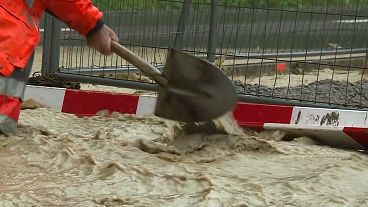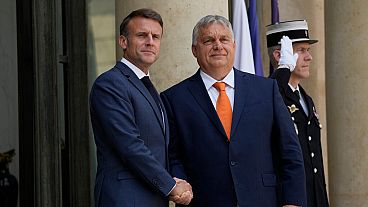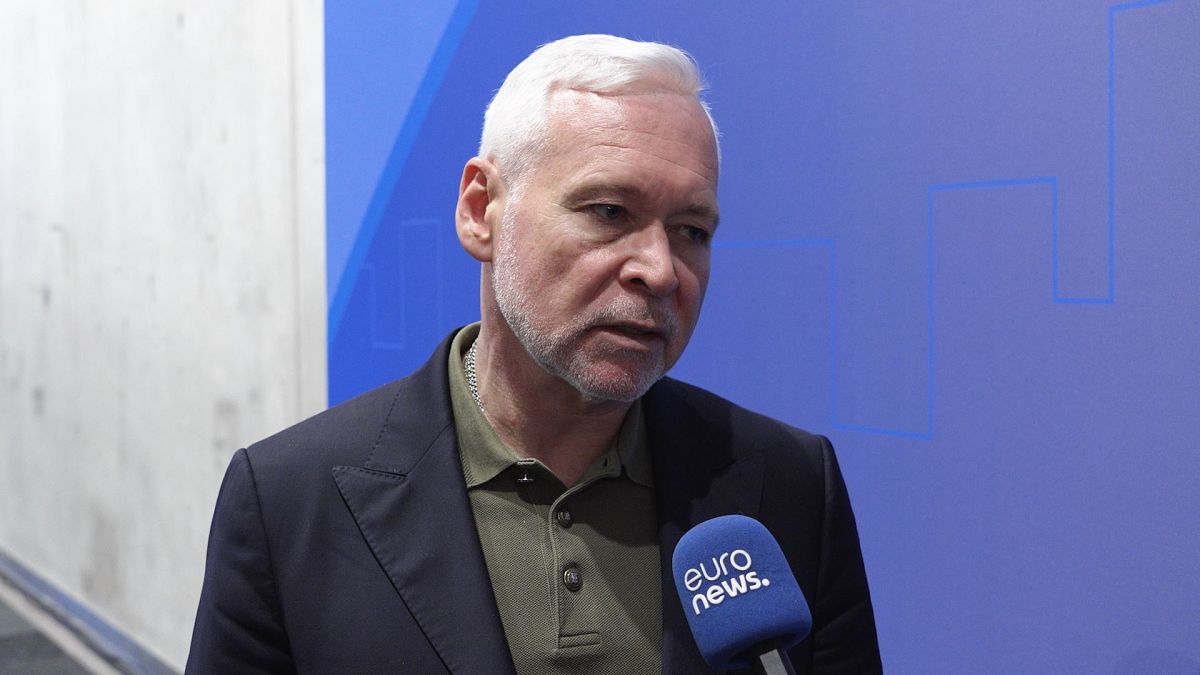Euronews spoke to Kharkiv Mayor Ihor Terekhov about the latest Russian offensive and what the city needs to survive the winter.
Despite the recent Russian offensive being halted by the Ukrainian Armed Forces, the situation in Ukraine's second-largest city remains critical, Kharkiv's mayor, Ihor Terekhov, told Euronews.
"Unfortunately, the situation is complicated, because unfortunately, we have attacks every day. Every day, we hear explosions in the city of Kharkiv. Almost every day people are killed, wounded, and the destruction is enormous. The enemy shells Kharkiv every day," he explained at last week’s Ukraine Recovery Conference in Berlin, where energy infrastructure and the situation in Kharkiv were at the forefront of topics discussed.
Despite Russia's increased attacks in the Kharkiv region lasting weeks during May, Terekhov said that, to his knowledge, not a lot of people have left Ukraine’s second-largest city.
"Some people left, but it wasn't a huge number. Most people are staying", he added.
The Ukrainian military is gradually pushing Russian troops out of Kharkiv Oblast, President Volodymyr Zelenskyy said on 17 June. According to Zelenskyy, Russian forces have suffered around 4,000 casualties during their latest offensive.
Terekhov was born in Kharkiv, and now, as the city’s mayor, he revealed his favourite thing about the city. "The best in Kharkiv are the Kharkiv residents," he said, emphasising that this is why "we need to work together to protect Kharkiv, to rebuild Kharkiv, and to restore life back to normal, as it was before the war."
Supporting Kharkiv’s residents' mental health
Missiles, glide bombs, and drones have been used to destroy energy infrastructure and kill civilians in Kharkiv, and its residents have been forced to endure air raids, which last an average of 16 hours a day. Terekhov knows the toll this takes on residents' mental health, explaining that for the past two years, "We have provided free public transport. We give people free rides and take children to school. We are doing everything we can to improve their emotional state, so they don't feel isolated". As part of these measures, he emphasised the city's importance of parks and green spots.
Children living in Kharkiv have had their educational journey disrupted first by the COVID-19 pandemic and then by Russia’s full-scale invasion in 2022. In response, Kharkiv built the first underground school, allowing around 900 pupils to study safely and without disruption. For Terekhov, this underground school is bittersweet, though.
"I really don't want our children to study underground. I really don't want Kharkiv to be underground. But this is a necessary measure. We understand this perfectly well, because we have no other choice at the moment," he said.
Mobilisation is underway
844 days into the full-scale invasion, Russia’s brutal onslaught hasn’t only taken a toll on Ukrainians but also decreased the lines at the conscription offices. In response, Ukraine reduced the conscription age for men from 27 to 25.
President Volodymyr Zelenskyy drafted the bills into law in April to strengthen the country's military, which is struggling to maintain its front lines. The new laws are expected to add around 50,000 troops but are a fraction of the 500,000 additional troops previously sought.
According to Terekhov, mobilisation is underway. "Yes, I remember the first days of the war, when there was a line to the military recruiting centres, when there was a line for receiving the weapons, we were distributing these weapons, and people received these weapons, went to fight, to defend their country, their city, and we understand this. Today the situation with mobilisation is still in progress, people are mobilising, and the military recruiting centres are dealing with this," he explained.
The upcoming winter scares many Ukrainians, with Nobel Peace Prize Laureate Oleksandra Matviichuk confessing that she’s not sure how they’ll survive the winter without electricity. The answer for many is air defence systems. If Ukraine can protect its infrastructure, Ukrainians won’t have to freeze.
Terekhov said that air defence systems are also needed to protect Kharkiv and its residents: "We need to close the skies over Kharkiv, and we need more air defence systems," he said.












